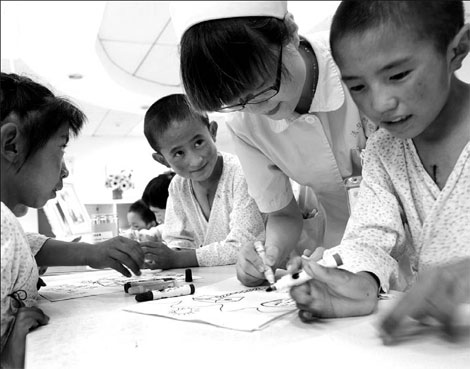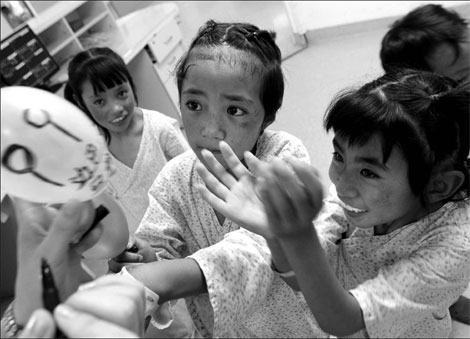
Children from Tibet autonomous region receive free heart disease treatment in Beijing. [Photos by Jiang Dong China Daily]

Youngsters, aged from 5 to 16, play and draw at Beijing Huaxin Hospital.
An initiative by Beijing Huaxin Hospital and some non-profit organizations provides diagnosis and operations to kids with congenital heart defects in Tibet. Liu Zhihua reports.
Renchen Wangmo, a 9-year-old Tibetan girl, plays with a balloon in a well-lit corridor of Beijing Huaxin Hospital, several thousands of kilometers from her home in Mali village, Gerze county, Ngari prefecture, Tibet autonomous region.
There are a dozen kids playing or drawing pictures with Renchen Wangmo, all from the same county, also heart patients at the hospital.
It is the first time the 5-16 year olds with heart problems - mostly atrial septal defects and patent ductus arteriosus (PDA) - have visited the capital.
They come to get free treatment for their congenital heart defects, supported by the hospital and some non-profit organizations.
Kids on the plateau suffer from a higher incidence rate of congenital heart defects, reports Chen Guoliang, a cardiac surgeon at the hospital.
They will die early if the defect is severe, and only those with mild congenital heart defects can live beyond 3 years old. But for those who live, life quality will be affected.
Red Cross statistics show the rate of congenital heart defects is about two to three times higher in Ngari prefecture than that of interior regions in the country.
The organization estimates that Tibet has about 8,000 kids suffering from heart diseases, and Ngari prefecture has about 500 to 800.
However, in the poor and sparsely populated area, medical care is limited and early diagnosis of the condition is rare.
Ba is a 12-year-old girl with PDA, which makes it hard for her to breathe and leads to frequent dizzy spells.
She often told us she felt bad, but we could do nothing, says Sengdo, Ba's father.
The family lives in a village about 200 km away from the nearest hospital, with the only transport options being tractors, motorbikes and horses, taking two days and costing about 200 yuan ($31.30) - which is a big burden for the family.
When Ba was 3 years old, the village doctor prescribed medication and intravenous drips, although he did not know what he was treating.
